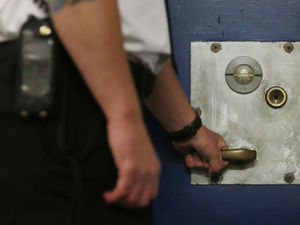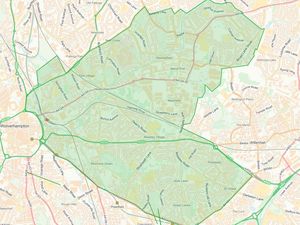Prison businessmen cashing in behind bars thanks to illicit economy driven by drugs and phones
A new report into prisons across the West Midlands today lays bare how organised gangs are driving crime behind bars.

The report, commissioned by Staffordshire’s Police and Crime Commissioner Matthew Ellis, finds the current level of crime in jails is centred around an illicit economy, with inmates willing to pay what it takes to get their hands on drugs and mobile phones.
That demand is being met by organised crime gangs, who are smuggling in and selling the contraband with a high mark-up – a basic mobile phone is changing hands for as much as £500, the report says.
Express & Star comment: Prison staff criminals 'scandalous'
In order to smuggle in items such as drugs, gangs use a variety of methods including visits, post, corrupt staff, drones and returning prisoners. Sometimes more than one method is used at the same time to ensure items make their way into prisons.
It is a report that matters to the West Midlands, which has a high number of prisons. Featherstone and Oakwood jails and Brinsford youth offending unit sit close to the M54. Birmingham Prison is based in Winson Green and in Shropshire Stoke Heath is near Market Drayton.
Mr Ellis’s report does not talk of individual prisons. But it speaks of established and varied smuggling channels into jails across the region.

He says: “Little is known about the frequency with which each route is used, or which is prominent in any place at a given time.
“But it is likely that if one becomes harder, attempts to use alternative importation routes kick in. We heard anecdotally from prisoners that dealers in prison tended to prioritise multiple means of importation at any time, to mitigate against potential losses and lessen risk of interruption to the business should one route be discovered. However, it is difficult to know just how much truth there is in these claims and how generalisable such observations are.
“Prison drug markets were able to respond to clampdowns in any one area, and while some could reduce availability short-term, those profiting would quickly attempt to find another way to import.”
The market in prisons is proving to be lucrative for criminals who are using their wide web of connections to meet inmates’ demands and turn a hefty profit.
However cash in hand is risky in prison, so a lot of the money is transferred via bank accounts, PayPal and cryptocurrencies, as well the bank accounts of friends, family and accomplices. This is driven by inmates having access to mobile phones, again supplied by the organised crime gangs.
As well as struggling to track the cash flow, another issue comes with identifying those who are involved with organised crime.
One man interviewed behind bars for the PCC’s report appeared to be a model prisoner with no fights, assaults or adjudications in the past few years.
But back on his wing and away from authorities he was driving criminality, making hundreds of pounds a week by organising the dealing of drugs.
The report says: “Police, prison, criminal justice staff and prisoners suggested that often those who sit at the top of the criminal hierarchy and control prison supply are prisoners who have established reputations for serious criminality and are recognised as organised crime gang nominals.
“This group often have several prior custodial sentences and a wider reputation for involvement in community-based organised crime, giving substantial criminal kudos. Indeed, access to firearms and a history of serious offending seem extremely common.
“Yet prison-based criminal entrepreneurs require networks and associates beyond the prison walls. Successful prison-based criminal entrepreneurs consolidate power by eliminating or subjugating rivals, taking control of key aspects of prison life (including contraband flows), and winning the capacity to mete out rewards and punishments to other inmates.”
Businessmen
Those at the top of the prison food chain are often referred to as ‘businessmen’, who succeed by flying under the radar and get ‘foot soldiers’ to take the risks and carry out their work. They are also described as ‘likeable and charismatic individuals’ who form good relationships with staff and fellow inmates.
These businessmen are the ones who make a pretty penny while being locked up – and the majority of that money comes from the illegal drug trade.
Mr Ellis’s report says: “Drug misuse is a serious threat to the security of the prison system, the health of individual prisoners and the safety of prisoners and staff. Illicit items, narcotics, tobacco, alcohol, weapons and mobile phones have a significantly high monetary value as part of the sub-rosa economy in prison custody, and trade in illicit items and narcotics have effects that ripple outwards to harm prisoners’ friends and families and the wider community of which they are a part.
“An increasing number of reports of the misuse of drugs in prison have been linked with the crisis in prison safety and security, and particularly some have come to argue that the availability of new psychoactive substances (NPS), particularly synthetic cannabis known as ‘Spice’ or ‘Mamba’, highly prevalent since 2012, and which are regarded by some commentators as a ‘game-changer’ have furthered impacted on the significant reduction in prison safety.”
Prisoners are drawn to drugs as a way to get through the “dull” days behind bars, the report added.
Mobile phones are also a good source of income for these organised crime gangs.
“What is certain is that mobile phones, while prohibited, are extremely widely available in some prisons but at prices significantly higher than in the community,” the 54-page report said.
In order to tackle the rise in crime in prisons across the West Midlands, Staffordshire and Shropshire – and the wider UK – Mr Ellis has come up with a five point plan:
Agencies, such as the prison service and police forces, working closer together
Preventing vulnerable individuals from being coerced or threatened into smuggling in contraband
Scrapping the vast majority of short-term sentences
Taking money from organised criminals to stop them from re-building
Dealing with crimes inside and making sure criminal behaviour is addressed
He said: “These recommendations set out practical ways to work together to prevent harm, disrupt criminality, protect communities from the effects of re-offending, safeguard vulnerable people and make better use of finite resources.
“In the West Midlands we’re pledging to deliver significant progress against these recommendations by 2020, which will make a real impact on reducing crime in the regions prisons.”
Mr Ellis’s report has been backed by West Midlands PCC David Jamieson, who said: “The report has assisted in identifying an approach to collectively tackle organised crime gangs which are embedded in our prison system.
“We can only tackle this issue by working together.”
West Mercia PCC John Campion added: “I welcome the recommendations for improved partnership working, and will ensure that action is taken to reduce the criminality which impacts not only on prisoners, but on the wider community.”





